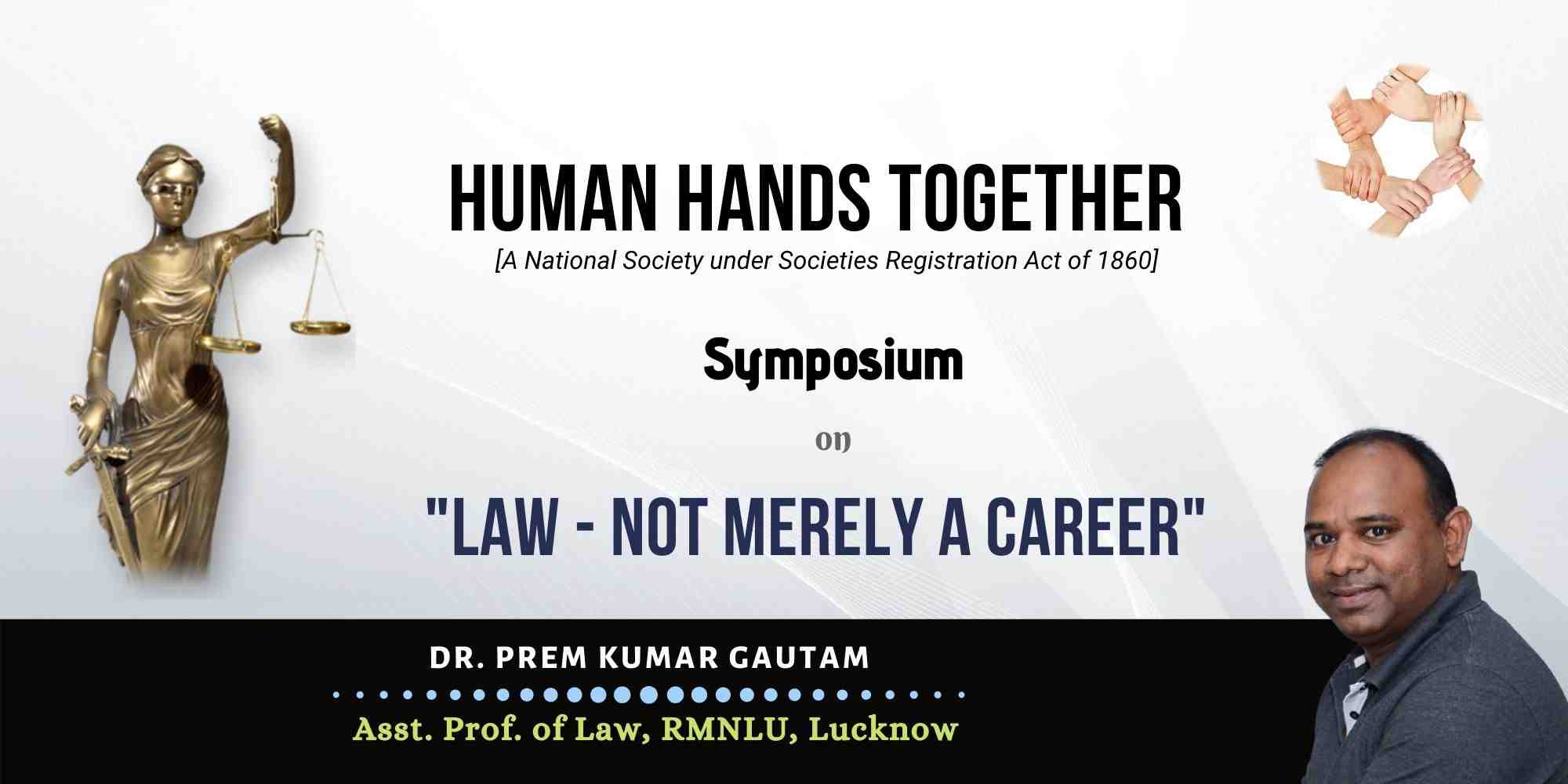- Dr. Prem Kumar Gautam
Dr. Ram Manohar Lohiya National Law University, Lucknow
The
legal profession as it exists in India today had its beginning in the earlier
years of British rule. The most talented and bright among the Indians were
attracted to the study and practice of law. The legal professionals dominated
the public life of the country and played a prominent role in the national
struggle for freedom. Law profession produces so many great leaders who not
only fought for the freedom of the country but also fought against the social
discrimination and bad practices prevalent in the society.
We
live in a society in which everyday life is touched by legal regulation more
than at any other period of history. One of the many ways in which human
societies can be distinguished from animal groups is by reference to social
rules. Legal rules are especially significant in the world of business,
politics, administration, human rights, conflict of laws issues, international
disputes and intercountry disputes including public and private.
The
law is a great profession and it offers greater and more varied opportunities
perhaps than any other profession. It is perhaps most significant social
institution for the settlement of disputes and it contains within its rules and
procedures means whereby infringement of the law, from the trivial to the most
serious can be dealt with.
In
the contemporary time legal professionals should try to promote the legal
culture in the country. Here I would like to quote Dr. Ambedkar who said in
this article “Thoughts on the Reform of Legal Education in the Bombay
Presidency” “The problem of overcrowding of legal profession must be separated
from the problems of legal education. It would be indefensible both from the
stand-point of education and also from the stand –point of social justice to
frame a scheme of legal education on a basis which would make legal profession
the preserve of the few. From the educationist point of view the study of law
requires a study of certain other auxiliary subjects without which the study of
law alone would be incomplete equipment for the practice of the profession.”
Connection
between law and other subject of humanities in India including literature are
ultimately about social justice and human rights. Most of the renowned
universities in the world including Oxford, Harvard, Cambridge and Australian
universities providing scholarship for talented and bright students for higher
studies in law. International organizations like United Nations and Red Cross
and Amnesty International preferring law graduate for the job and social
service. Law is for them a mission rather a subject for the job.
National
law universities/schools are established to promote legal education with social
justice. Students are studying not only law subjects but also sociology,
history economics and political science. Though the aim of law schools was to
produce law professionals who can go in corporate sector but scenario has been
changed and many law graduates of the NLUs are joining government services,
they are becoming judges, prosecutors, doing social services, going abroad for
higher education and joining academics etc.
Now,
what I think legal profession is not limited to advocacy or judgeship only. A
law graduate has more options beyond these opportunities. A law graduate can
make his career in academics, bank, NGO, international organization; law firms
and social advocacy and he/she can become politicians too. Most of the
successful politicians are law graduate. Apart from these career options there
are some other options also available like legal executive, Para legal
volunteers etc.
A
law graduate has a different status as compared to non-law graduate. We can say
that a law graduate has a legal mind to think legally and act accordingly. A
law graduate can bring the change in the society and can fight for the rights
of the weaker section of society. A law graduate can promote the fundamental
values enshrined in our constitution like equality, religious freedom, justice,
fraternity and liberty. For this a passion is required. We all nurture a
passion but few translate it into an action. An action driven by passion can
transform lives.
In
the present scenario the role of law profession is significant. People,
societies and countries are not fighting in the battle ground but fighting in
the court of law through the legal means. Here I can say that every future war
would be in the court and not on the ground.
The
role of legal fraternity is also important in legal profession. In addition to
their teaching duties, law teachers are active in conducting research and
publishing their research finding in almost all areas of law in the country. We
can see their contribution in so many landmark judgments of the Supreme Court,
where court cited the articles of renowned intellectuals belongs to law field.
The work of local and overseas legal academics are cited in the courts and
referred to in judgments.
Academicians
can play an important role in the development of the law. The written and
published opinions of the academics on the law, what it is, and what it should
be- collectively referred to as the doctrine- is an important, though not
binding, and source of law. It is therefore important to have a lively legal
academic community in a democratic country.
Comments
of law teachers are sometimes highly critical to the government. But the
constitution of the country protects the autonomy and academic freedom of
educational institutions and the protection is extended to cover teaching staff
employed by the institutions. Rule of law should be followed by everyone.
Law is a way of life, not merely
one’s career. It is perhaps, the sole profession
(besides medicine of course) which is inevitably applied and verily utilized by
each and every person at some point of time in their lives. Whether a lawyer or
not, one inexorably does come across this field in its variant forms, be it a
relative’s property dispute, a family member embroiled in a civil litigation, a
stark case of corporate fraud or an unfortunate series of criminal trials. It
is thus, significant to comprehend and appreciate the law, not merely because it
is one’s career, but a knowledge based skill that may be ubiquitously and
pragmatically used by one and all.
Law
has always been a principled profession, since lawyers have always endorsed and
strived for a better and peaceful society. Lawyers have indeed proved to be the
true beacon light bearers for people. For instance, Lokmanya Bal Gangadhar
Tilak who roared Swaraj is my birth-right
fought his own case in a British Court that accused him of sedition. Mahatma
Gandhi, yet another lawyer, determined
independent India’s future and destiny. Justice Krishna Iyer in one of his
judgements emphatically has opined “Law
is not a trade, not briefs, not merchandise, and so the heaven of commercial
competition should never vulgarize the legal profession.” He believes the
underlying ethos of the legal profession is the service to society, akin that of a doctor. In other words,
the principal aim of law is to protect citizens from social diseases. Hence, it
is essential to persistently ruminate upon the aim of the law, especially as a
young budding lawyer, should you wish to excel in this field.
Today,
law as a preferred choice of career has found sudden colossal success,
especially with Indian law schools churning over 3.5 lacs law graduates per
year, as per the data made available by the University Grants Commission.
However, not all law graduates make respectable lawyers. Only a selected few
are able to ascent the ladder of success which is encumbered with cut throat
competition, outstanding legal knowledge and professional acumen. Charles
Darwin says, it is only the fittest that survive. In other words, only those
survive and subsequently, succeed for whom the law is their passion and not
merely their career. Passion ought
to be the north-star in the constellation of a lawyer’s career universe. That
to me is another innate quality of survival, found in almost all promising
lawyers of India.
The
Hon’ble Supreme Court in the case of Chief
Justice of Andhra Pradesh and others
v. L.V.A. Dixitulu and Others highlighted that the law is a living,
integrated organism having a soul and consciousness of its own and its pulse
beats, emanating from the spinal cord of its basic framework, and can be felt
all over its body, even in the extremities of its limbs. Through its dynamic and
purposive interpretative approach, the judiciary strives to breathe life into
the law and not render it a collection of mere dead letters. Lawyers, as
society’s catalytic agents have the potential to enable and urge the Courts and
law to adapt to the ever-changing circumstances without losing their identity.
In other words, practising the law is not merely a career choice but a
community outreach programme undertaken for life because law is the legal
expression of a society’s moral, political and economic ideology.
Besides
passion, patience and hardwork illustrate and illuminate the hallmarks of an
able lawyer. As a career choice, the law makes all of us question, on a daily
basis “What, Where, When and How”. This
critique ability enables lawyers to
adapt to the ever-changing needs and sociological developments taking place in
the society. The role of lawyers in realizing the evolving nature of this
living instrument called the law is undoubtedly the embryonic cognitive which
makes it worthwhile for me to deliberate with you in much greater detail, its
charms and challenges.


